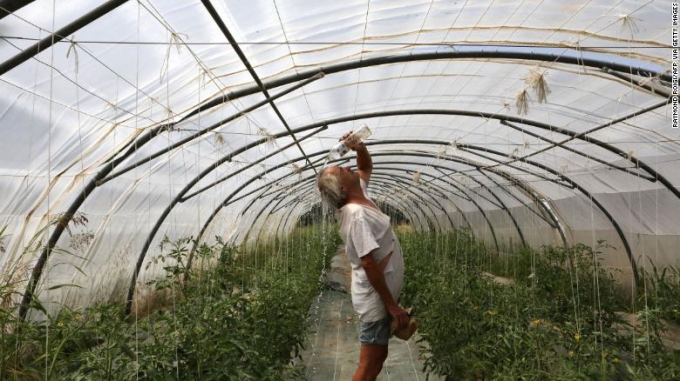May 24, 2025 | 16:27 GMT +7
May 24, 2025 | 16:27 GMT +7
Hotline: 0913.378.918
May 24, 2025 | 16:27 GMT +7
Hotline: 0913.378.918

A farmer pours water on his face as he works in a greenhouse in southern France on June 17 as western Europe struggles with a heatwave.
Such was the heat that England's upscale Royal Ascot Racecourse even saw a rare change of protocol: guests were allowed to shed hats and jackets once the royals had passed.
"Avoid over-exposing to the sun, hydrate and take care of the most vulnerable so they don't suffer from heat stroke," was the advice from Spanish Prime Minister Pedro Sanchez in Madrid during an event, fittingly, about desertification.
Temperatures reached 40 degrees Celsius (104 Fahrenheit) in Madrid on Friday, the national weather agency AEMET said. A level not seen so early in the year since 1981.
Northern Italian regions risk losing up to half their agricultural output due to a drought, a farm lobby said, as lakes and rivers start to run dangerously low, jeopardizing irrigation.
The federation of Italian utility companies, Utilitalia, warned this week that the country's longest river, the Po, was experiencing its worst drought for 70 years, leaving many sections of the vast, northern waterway completely dried up.
The heatwave piled pressure on energy systems as demand for air-conditioning risks driving prices higher, adding to the challenge of building up stocks to protect against any further cuts to Russian gas supplies.
'Health risk'
In France, the Gironde department around Bordeaux prohibited public events including concerts and those at indoor venues without air conditioning, a local official said.
"Everyone now faces a health risk," Gironde prefect Fabienne Buccio told France Bleu radio.
Temperatures in many of France's areas hit 40 Celsius for the first time this year on Thursday and were expected to peak on Saturday, climbing to 41-42 Celsius. A record night temperature for June, 26.8 Celsius, was recorded in Tarascon, southern France.
Fourteen administrative departments were on red alert, with schoolchildren told to stay at home in these areas. Speed limits were lowered in several regions, including around Paris, to limit exhaust emissions and a buildup of harmful smog.
Britain's weather service said Friday was the hottest day of the year so far, with temperatures above 32 Celsius in some parts of the southeast.
Parks, pools and beaches were packed, and while many enjoyed a day of fun and freedom after two years of periodic pandemic restrictions some were also worried.
"I'm from Cyprus and now in Cyprus it's raining ... and I'm boiling here, so something must change. We need to take precautions about the climate change sooner than later because undoubtedly it's worrying for all of us," said student Charlie Uksel, visiting Brighton, south of London.
"Now we are enjoying it, but for the long-term we might sacrifice."
Mediterranean nations are more and more concerned about how climate change may affect their economies and lives.
"The Iberian peninsula is an increasingly dry area and our rivers' flow is slower and slower," Spanish leader Sanchez added.
Firefighters were battling wildfires in several parts of Spain, with Catalonia in eastern Spain and Zamora near the western border with Portugal the worst hit.
In Zamora, between 8,500 and 9,500 hectares turned to ashes.
The cloud of hot air was sparing Portugal on Friday, where temperatures were not as high as in other European nations, with Lisbon likely to reach 27 Celsius.
However, last month was the hottest May in 92 years, Portugal's weather agency IPMA said. It warned that most of the territory is suffering from a severe drought.
Portugal's reservoirs have low water levels, with the Bravura dam of the most affected at only 15% full.
(CNN)

(VAN) Alt Carbon has raised $12 million in a seed round as it plans to scale its carbon dioxide removal work in the South Asian nation.

(VAN) Attempts to bring down the price of the Japanese staple have had little effect amid a cost-of-living crisis.

(VAN) Fourth most important food crop in peril as Latin America and Caribbean suffer from slow-onset climate disaster.

(VAN) Shifting market dynamics and the noise around new legislation has propelled Trouw Nutrition’s research around early life nutrition in poultry. Today, it continues to be a key area of research.

(VAN) India is concerned about its food security and the livelihoods of its farmers if more US food imports are allowed.

(VAN) FAO's Director-General emphasises the need to work together to transform agrifood systems.

(VAN) Europe is facing its worst outbreak of foot-and-mouth since the start of the century.